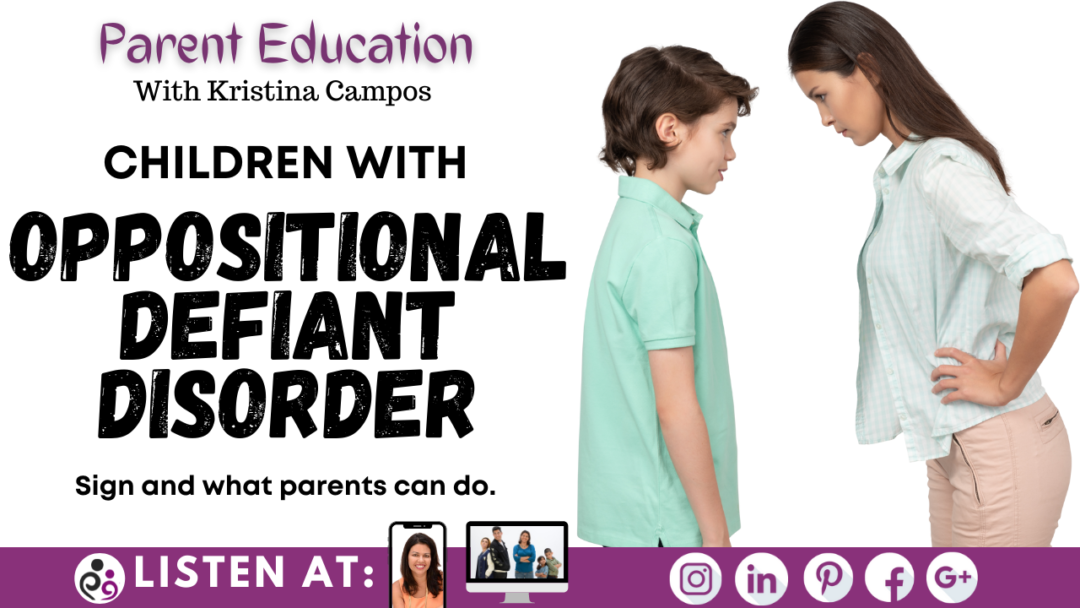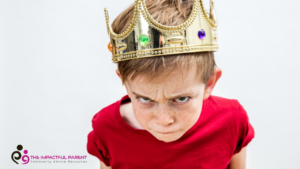Kristina Campos, the founder of The Impactful Parent, talks to parents about the signs of Oppositional Defiant Disorder In Children and how parents can help their children.
Click on the link below to listen to the podcast! 👇
LINKS MENTIONED IN THE RECORDING
Oppositional Defiant Disorder
https://theimpactfulparent.com for more FREE Resources and paid programs.
https://theimpactfulparent.passion.io/
https://apps.apple.com/app/impactful-parent/id1601274505
https://play.google.com/store/apps/details?id=com.prmto733iicm.ptt70cx5app
to download the FREE Impactful Parent App. Freebies included.
Rate, Review, & Subscribe!

“I love Kristina and all the FREE tips that she has to offer! Thank you for making my parenting journey better!” <– If that sounds like you, please consider rating and reviewing my show! This helps me support more people — just like you!!!
Rate with five stars, and select “Write a Review.” Then be sure to let me know what you loved most about the episode!
Also, if you haven’t done so already, subscribe to the podcast. I’m adding a bunch of bonus episodes to the feed and, if you’re not subscribed, there’s a good chance you’ll miss out. Subscribe now!
What to do next:
1. Get The Impactful Parent App! Everything you need in your parenting journey in one spot! Available on the Android Play Store and the Apple Store. Search Impactful Parent (direct links listed above under Links in Episode).
2. Follow The Impactful Parent on social media if you don’t already! Facebook, Instagram, LinkedIn, & Pinterest
4. Check out the official website of The Impactful Parent for FREE RESOURCES, parenting classes, mom’s groups, and so much more! Click here to check it out!
5. Discover how you can work with Kristina! Sign up for a FREE 30-minute discovery call! Click here to find a time that works best for you!
Bottom Line… I am here for YOU! Contact me at theimpactfulparent@gmail.com

TRANSCRIPT
Oppositional Defiant Disorder
Understanding Oppositional Defiant Disorder
Welcome Impactful Parents. Today we are going to talk about Oppositional Defiant Disorder. Signs of the disorder and what you can do as a parent.
Hello, my name is Kristina Campos. I am the founder of the Impactful Parent. Every week I come on and answer one of your questions LIVE. If you have a question for next week, please submit it at theimpactfulparent@gmail.com or by messaging me on social media. All submissions are kept anonymous.
Today’s question from the audience is asking to understand Oppositional Defiant Disorder, so this parent (and you) can identify the symptoms and decide if their child needs to seek more help.
Thank you for submitting this question! Today I will tell you the signs of Oppositional Defiant Disorder and stick around to the end because I am giving you 10 tips for helping your child so you can be a more impactful parent. Let’s get started!

Oppositional Defiant Disorder
Oppositional Defiant Disorder, or ODD, is when a child displays a continuing pattern of uncooperative, defiant, and hostile behavior towards people in authority. This could be anyone in authority and doesn’t always have to be a battle against parents.
So what makes Oppositional Defiant Disorder different than a child that just seems to be argumentative or doesn’t want to follow the rules? For children to be diagnosed with ODD, they need to have most of the following symptoms for more than 6 months. A lot of children will go through a phase of rebellion, but children with ODD will refuse authority figures way beyond the length of “just a phase.”
- It will feel like the littlest thing might set off a child with ODD.
- The ODD child has to win arguments, and they won’t give in to boundaries, rules, or someone trying to control them.
- Children with Oppositional Defiant Disorder have frequent temper tantrums.
- Children with Oppositional Defiant Disorder will argue with adults intentionally. It may feel like they are just picking a fight, and they will refuse to do what adults ask.
- Children with ODD can be very challenging because they will always question the rules and refuse to follow any rules they don’t perceive will serve them.
- Kids with ODD typically won’t hesitate to speak harshly to their parents, teachers, police officers, or anyone in authority. These kids are also annoyed with adults in authority often and will openly look angry and resentful.
Two of the most obvious qualities differentiating a typical rebellious child against a child with Oppositional Defiant Disorder is that children with ODD will be vindictive, be spiteful, do things to annoy or upset others on purpose, and blame others for their own misbehaviors or mistakes. Children with ODD don’t typically take responsibility for their actions even when the blame is obvious.
Causes of Oppositional Defiant Disorder are unknown. Sometimes it can come from the onset of a head injury or developmental factors. Other times doctors say it could be genetic, developmental, or learned. ODD is associated with absent or neglectful parenting, but children with loving and present parents can also develop this condition. Either way, the exact reasons why anyone has ODD are unknown. To make things more difficult, Oppositional Defiant Disorder often is co-occurring with other disorders such as ADHD, depression, anxiety, bipolar disorder, conduct disorder, and other learning disorders. It is also a misconception that Oppositional Defiant Disorder develops only in adolescents. This isn’t true. ODD occurs at all ages of development and adulthood. 10.2% of all children develop ODD. Usually diagnosed at around age 8.
Problems that come with ODD are usually:
- Poor school performance,
- Anti-social behavior,
- Substance abuse,
- Trouble building relationships,
- Poor impulse control,
- And suicide.
Oppositional Defiant Disorder
Parents need to educate themselves and get their children help with such detrimental repercussions. ODD is treatable. More than 65% of children with ODD see their symptoms go away in 3 years or less when kids get help.
So, what can parents do?
- First of all, do not punish behaviors associated with ODD. It doesn’t help. In fact, harsh discipline is a risk factor for developing the condition and can even make your child’s condition worse. So obviously, this makes disciplining and parenting a challenge.
- Instead, take the child to a mental health professional. Once your child is officially diagnosed with Oppositional Defiant Disorder, your doctor will encourage you to go to a therapist. The therapist will likely suggest various types of help. Some may suggest parent-child interaction therapy; others will recommend individual or family therapy. Some therapists may suggest parent training, social skills training for the child, or problem-solving training for the parent and the child.
- Praise positive behaviors and give rewards for behaviors you want to see again. Focus on the good behaviors you see your child doing. Your child needs praise and recognition for things they do well (even if you’re praising them for tasks that you feel any child should automatically do.) Children with ODD are used to adults being angry, frustrated, and annoyed with them. You want to give your child the opposite reaction and focus on giving your attention when things are going well, so they don’t seek your attention negatively.
- Model the behavior you want to see. Kids don’t know what they don’t know. So many times, parents just tell kids, “No, or “don’t do that,” but don’t tell the child what they SHOULD be doing. It is not natural for kids to automatically understand better behavior. Parents need to SHOW children what they want from them. It is important to replace the bad behavior with what you need them to do, instead of leaving the child hanging with only what they can’t do.
- Avoid power struggles. Pick your battles and be selective with your boundaries.
- Create a routine and provide consistency in the child’s life. This means providing consistency with rules, expectations, and consequences for their actions. These things (rules, expectations, and consequences) should be discussed when the child is in a good mood and set as a standard when things are going well. Set limits and consequences for actions before they are trouble
- Connection is important. These kids need more love and attention than you realize. They already have plenty of adults angry and frustrated with them.
- Make sure every adult in the kid’s life is on the same page. This goes back to creating consistency. Behaviors and expectations should be universal. Collaborate with teachers, coaches, counselors, and anyone else who might be in the child’s life to create a consistent standard of expected behaviors.
Oppositional Defiant Disorder
- Set your child up for success on purpose. This might be giving them a chore to do around the house that really doesn’t matter if it gets done or not, but is still important to the household. Then, when the child completes their chore, you now have an opportunity to praise them and focus on the positive.
- Take care of yourself. These are not easy children to parent, and your self-care should also be a priority. If you are tired, your patients will be shorter, and your mood will be more irritable. You need to take care of yourself to take care of your child. Make sure you are sleeping, socializing with friends, and eating well. I also suggest joining a parenting support group to help you vent in a safe place and get ideas from others about what works and what doesn’t work in other households.
I hope that was helpful today. My last piece of advice for parents of children with ODD is to expect their child’s behavior to worsen before it gets better. These children will likely reject any change they see in you, even if the change is positive for them. They will test your patients and push your buttons to see if the change you are creating is really intentional and if you really mean it. But now that you know that the behaviors will worsen before they get better, you can anticipate that rollercoaster and prepare yourself for the ride.
And if you have a question you want to submit for me to answer live, please do! Submit your questions by DM or email at theimpactfulparent@gmail.com. Plus- if you want to become a more Impactful Parent, check out all that my website has to offer! I have parenting courses, family coaching, a free downloadable app, and many free resources. But until next time, you got this, parents. I am just here to help.
It takes a lot to run a family! Here are a few products I recommend.
Gabb Wireless: The BEST first phone for your child!
- No internet, no social media, and NO WORRIES! This phone has GPS tracking and other features that parents want to have peace of mind about their child having a phone. The Gabb Wireless phone has the sleek look of a smartphone that kids love without worry and high price. To find out more and order your phone (or watch) go to: gabbwireless.com/promo/IMPACTFULPARENT30



